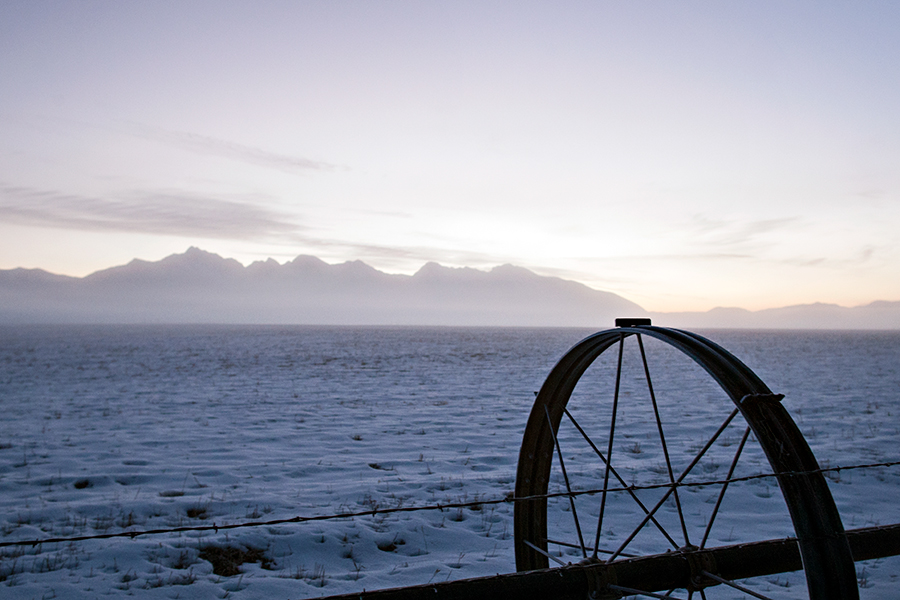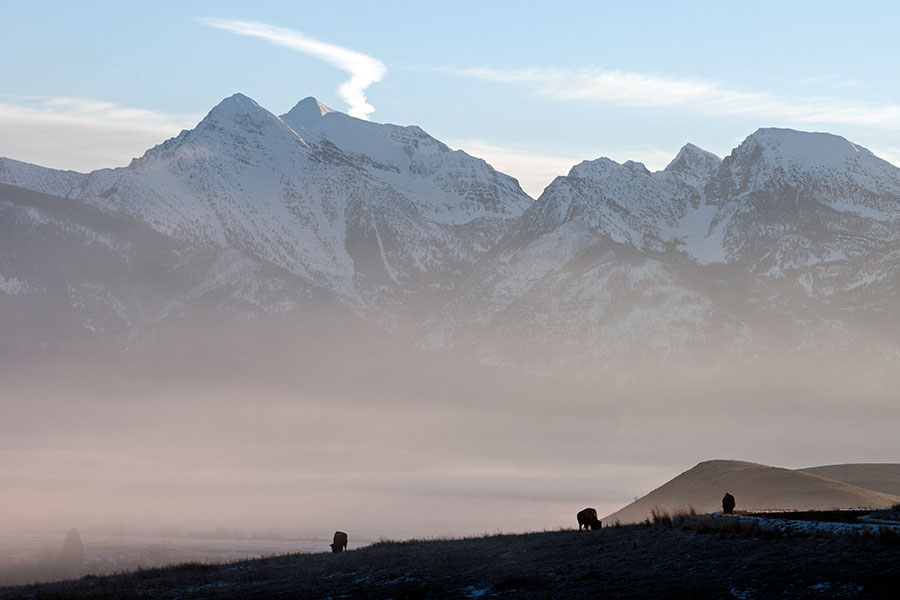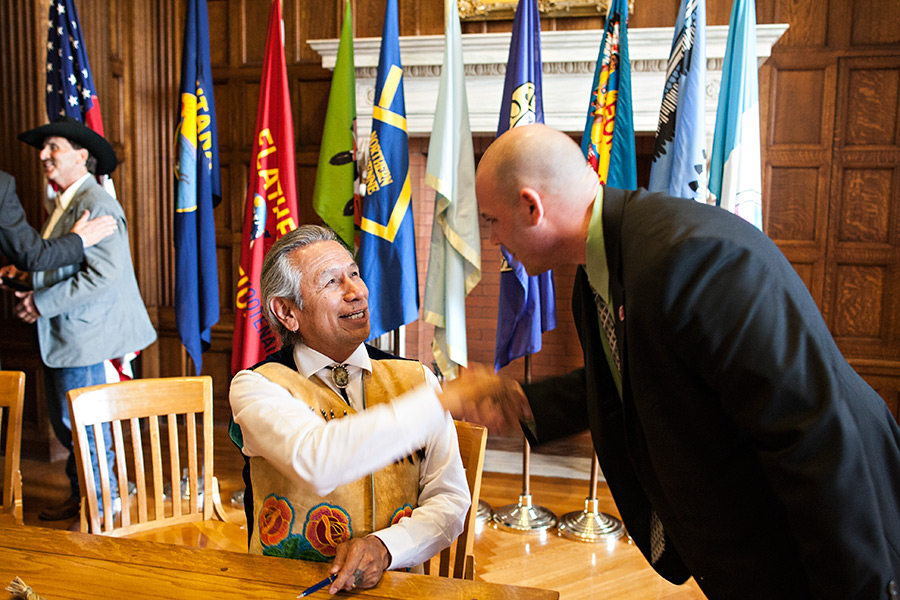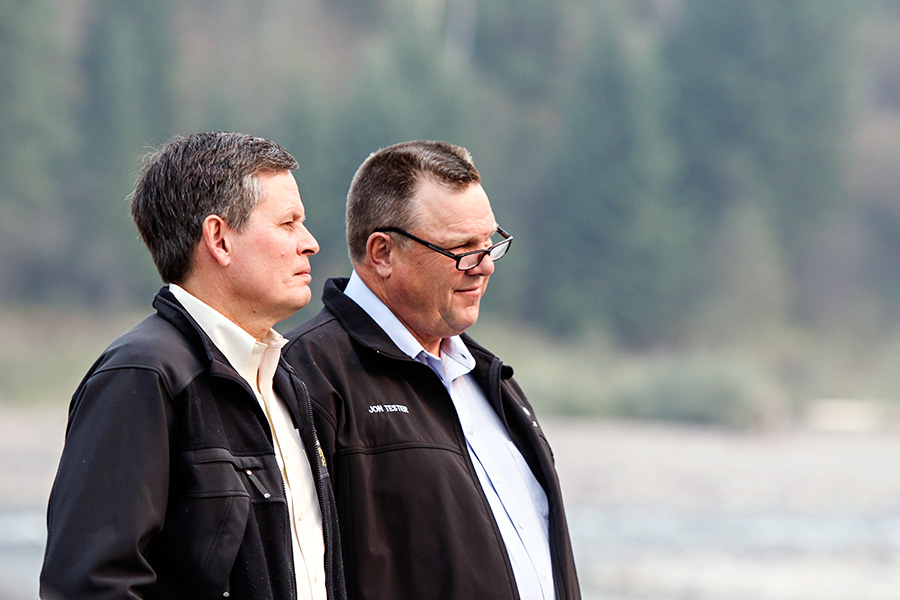Federal Spending Bill Ratifies Flathead Water Compact
$1.9 billion measure allows Confederated Salish and Kootenai Tribes to relinquish water rights claims, assume trust control of the National Bison Range
By Tristan Scott
A year-end federal legislative package ushered through Congress late Monday night includes a measure to resolve an age-old conflict over water rights on the Flathead Indian Reservation, striking an accord that tribal leaders hailed as “one of the most significant days in the history of our people.”
“This … will have a profound and positive impact on the future of the Flathead Reservation for the next century,” according to Shelly Fyant, chairwoman of the Confederated Salish and Kootenai Tribes, who cheered Monday’s news that a sprawling federal appropriations package would also resolve the long-disputed water rights negotiations.
The $1.9 billion measure will ratify the CSKT water compact and settle a decades-long struggle to define the Tribes’ federally reserved water rights. It was billed by Montana’s entire congressional delegation, as well as CSKT leaders and other key stakeholders, as the best course of action to avoid costly litigation, modernize outmoded irrigation systems in the Flathead Valley and mitigate historic damage to natural resources, while also restoring tribal management of the National Bison Range
Introduced last December by U.S. Sen. Steve Daines, R-Montana, and co-sponsored by U.S. Sen. Jon Tester, D-Montana, the Montana Water Rights Protection Act is the result of hard-fought negotiations that have dragged on for years, requiring the CSKT to permanently relinquish 97 percent of its off-reservation water claims across Montana, including all of those in the Flathead Valley.
On Dec. 21, Montana’s senators succeeded in attaching the bipartisan compact to the omnibus appropriations package that Congress passed along with its COVID-19 relief bill.

Tribal leaders have long expressed support for the legislation, which in addition to ratifying the compact also settles damages brought by the federal government for mismanaging the Tribes’ water and water rights guaranteed under the Hellgate Treaty.
The costs associated with the bill would also help rehabilitate the Flathead Indian Irrigation Project (FIIP), a federally established network of diversion works, canals and other infrastructure that serves 127,000 acres of agricultural land, and which has fallen into varying degrees of disrepair. And the bill would give Lake and Sanders counties $10 million for road infrastructure.
“With passage of S. 3019, we will be able to rehabilitate and modernize the Flathead Indian Irrigation Project and restore damages to fish and wildlife habitat caused by the project, while simultaneously protecting farmers and ranchers who depend on irrigation for their livelihoods,” according to Fyant.
Another major incentive for the Tribes lies deep within the bill’s text and deals with the transfer of management responsibilities surrounding the National Bison Range, shifting its oversight from the federal government’s purview to the Tribes’.
As part of the settlement of the damage claims, the legislation would restore the National Bison Range to federal trust status for the Tribes, which was the status of the land under the Hellgate Treaty. The legislation would require the Tribes, as opposed to the U.S. Fish and Wildlife Service (FWS), to manage the Bison Range for bison and wildlife conservation, as well as for public access.
Both Daines and Tester hailed the legislation as an infrastructure and jobs bill, even though its primary purpose is to resolve thousands of water rights claims, removing the threat of litigation while quantifying the Tribes’ water rights and providing assurance to all water users, both tribal and non-tribal.
In exchange for the benefits, the Tribes would waive and release all claims related to water rights.

Before being implemented, Tribal water rights compacts must pass the state Legislature and both chambers of Congress, and be approved by the Tribe and Montana water court. In 2015, after a decade of negotiations between CSKT, the state of Montana, and local landowners, the state Legislature passed the bipartisan CSKT Water Compact.
In addition to the support from Montana’s congressional delegation, the Montana Water Rights Protection Act also garnered high marks from the Trump administration.
At a June congressional hearing before the U.S. Senate Indian Affairs Committee, which both Daines and Tester serve on as members, Department of the Interior Assistant Secretary Tim Petty commended tribal and state officials for bringing “significant leadership” to the negotiating table and said the Trump administration supports the level of funding.
U.S. Attorney General William Barr also supported the compact, as did Montana’s Republican Attorney General Tim Fox.
“I cannot overstate the historic significance of this milestone in the 165 years since the signing of the Hellgate Treaty,” according to a statement from Fox.
Still, some state Republicans remain opposed to the compact, including state legislators and Lake County commissioners, saying it yields too much control of water rights to the tribes, and that the dollar figure attached to the measure — $1.9 billion — was negotiated outside the public purview.
But Daines and Tester have dismissed that the process to ratify the compact has been anything less than transparent, with Daines calling the legislation “a product of working for years with stakeholders from all sides on a compromise that can move forward — on that can be signed into law.”
With the bill en route to the President’s desk, that signature should soon be inked.
“After years of hard work, the U.S. Senate just passed our bipartisan bill that permanently resolves the century long CSKT water dispute, and will soon become law. Without our bill, thousands of Montanans would be forced into very expensive litigation and our ag economy would’ve taken over a one billion dollar hit,” Daines said in a statement.
“This victory has been decades in the making, and is a huge win for Montana taxpayers, ranchers, farmers, and the Tribes,” added Tester. “Water is among our most valuable resources, and ratifying this Compact honors our trust responsibilities, creates jobs and invests in infrastructure while providing certainty to water users everywhere. I’m thankful we were able to work together to get this critical legislation across the finish line.”

Fyant said the compact’s fate would have been far more uncertain without the support of Montana’s elected leaders given the circuitous channels tribal water rights compacts must navigate prior to ratification.
“I cannot express how much we appreciate the hard work that the Montana Congressional Delegation put into this bill and now having it signed into law,” Fyant stated.
“This will conclude a very long and difficult effort to quantify the water rights of the Selis, Qlispe, and Ksanka People,” she added. “This means we can avoid decades of acrimonious litigation on streams across much of Montana and protect many streams with sufficient amounts of water to ensure fish can survive and Montana’s residents can recreate and fish as they have for generations. The bill will also restore the National Bison Range back to Tribal ownership where it will be professionally managed for bison conservation and will remain open to the public. The implementation of the settlement will create thousands of good paying jobs and help boost our regional economy. This is a once-in-a lifetime moment for CSKT.”